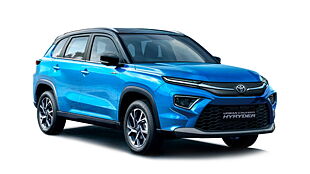Introduction

Just as Mercedes-Benz is synonymous with luxury and BMW with sportiness, Toyota has established itself as a byword for quality and reliability. For years the Japanese automaker has churned out a range of well put together cars. Get behind the wheel of one and straightaway you’d be under an impression that it’s a thing that will probably last forever.
Oddly enough, it’s the knack of endlessly producing functional and reliable products that makes Toyotas of today (except for the utterly brilliant GT-86) rather dull and soulless appliances. Take the Etios for instance. On sale in the Indian market since 2010, the car has come under heavy criticism for its uninspiring design and low-rent interior. So when we heard that Toyota was bringing out a facelifted version, our first thoughts leapt to visions of a refreshing new Etios that is far more impressive to look at and sit in, compared to the earlier model.
What we have here, however, is a quick makeover for 2015 with focus primarily on safety and comfort. Nevertheless, it’s time to see how well the improved Etios stacks up, in line with the current group of entry-level and sub-4 metre sedans.
Design

The Etios originally was barely a head turner. Its appeal was more inherent in what it offered to the buyers. For 2015, the sedan has gone under the knife although one will be hard-pressed to spot the updates in the overall design. Upfront, the Etios still greets you with a wide grin but in the facelifted version, the redesigned grille comes finished in chrome to lift up the street presence. It is worth noting that the base-spec variants will be offered with a matte black grille and not the fancier chrome finished unit featured here.
Toyota is also offering a new paint colour for the facelifted model; called pearl while, the well layered option is a welcome addition as it makes the Etios that extra bit nice to look at. A few other upgrades such as the 12-spoke alloy wheels and rear-view mirrors with turn indicators continue to enhance the appearance of the car.
All in all, the minor design upgrades help differentiate the Etios facelift from its more traditionally styled predecessor. Although the Etios now puts forward a stronger case for itself in terms of design, it is still far from striking looking and seems a generation old when pitted with newer rivals like the Tata Zest and the Hyundai Xcent.

Interior

Inside, the cabin design remains nearly untouched for 2015, with the exceptions being the new electrically adjustable wing mirrors and beige coloured fabric upholstery. Also new are faux-wood inserts on door armrests. Thankfully, the faux-wood bits do not look as shoddy as the ones found in the old Innova and Corolla models.
As one would expect, the overall design is still very basic but the materials are of good quality. Although all of the controls are well laid out and fairly easy to use, the centrally mounted instrument cluster still divides opinion. Speaking of which, the cluster is dominated by two quite large analogue gauges and a digital display which houses a trip meter and fuel gauge and that’s about it. In this day and age of virtual reality, both real time fuel efficiency and distance-to-empty gauge is sorely missed. Unfortunately the entire cluster looks a bit chintzy and sticks out like a frost-bitten finger in an otherwise well thought-out cabin.
Despite the fact that it belongs to the entry-level sedan segment, the Etios boasts of a properly comfortable cabin with generous amount of space both in front and at the back. The front seat offers good comfort levels and thanks to the ergonomically designed cabin, it’s easy to get comfortable behind the wheel. Meanwhile, at the rear, the flat bench is surprisingly supportive and can accommodate three full-sized adults without much trouble. The most impressive bit though, is how practical the cabin is: besides the big 13-litre glove-box with an unusually large opening that takes up most of the front passenger’s legroom, Toyota has included plenty of storage bins to keep hold of the usual set of knick-knacks while driving.

Boot space is of big concern for buyers of this segment, and since there is an impressive 595-litre of it, the Etios doesn’t disappoint. The boot, in fact, is usefully big and can accommodate a weekend’s worth of luggage with ease.
Speaking of equipment, the range-topping versions are very well specced out, with standard features including height adjustable driver’s seat, steering mounted audio controls, chilled glove box, besides the Bluetooth-enabled audio system and the two-tone interior. Also, the cabin looks and feels a bit better put together than the previous Etios. As for safety, Toyota has made some drastic improvements in this area. The facelifted Etios, as a result, features dual front airbags, ABS with EBD, rear parking sensors and a seatbelt reminder. Better still, the dual front airbags are now standardized across the range which means even the entry-level versions benefit from the essential safety feature.
While the cabin is now comparatively a nicer place to be in, the design leaves a lot to be desired. The fit and finish at places are a bit dicey (read: headlamp levelling knob) and the overall look is nowhere near as appealing as one would expect in a car of this segment.

Performance

If there is one area Toyota hasn’t bothered to ‘innovate’ with the facelifted Etios, it’s under the hood. There are no upgraded powertrains, only the same old petrol and diesel engines we have been seeing for quite some time.
Available with either the 1.4-litre, D4-D diesel or the 1.5-litre petrol engine, we tested the diesel which, incidentally, also powers the bigger Corolla Altis albeit in a higher state of tune. With about 67bhp of power and 170Nm of torque, this 1.4-litre, four cylinder turbo diesel engine not only offers reasonable amount of grunt, but does the job in a rather smooth, linear way. Gearshifts, too, on the short-throw 5-speed manual gearbox are quick and smooth.
Thanks to a strong bottom-end, the Etios goes off the moment you prod the throttle pedal. The diesel engine is surprisingly responsive at crawling speeds and as the revs rise, it has enough torque to get you out of light traffic. While refinement levels are not the best in class, this engine obliges to be revved and it is only when the needle is hovering near the redline that it starts to feels like it’s being put through heavy strain.
The low kerb weight (just 1020 kilograms) and well-spaced gear ratios allow the Etios diesel to easily keep up with most other diesel cars in its segment. It’s only at highway speeds where the engine’s power deficit is apparent. It’s also where the Etios will be outclassed by more powerful diesel cars like the Maruti Suzuki Swift Dzire and the Honda Amaze.

Ride and Handling

The new Etios retains the old model’s trademark of gliding over bumps and potholes. Featuring Macpherson struts and a torsion beam at front and rear axles respectively, the overall suspension setup is well suited to Indian roads. As a part of the vehicle’s previous update, Toyota raised the ground clearance a bit and optimised the suspension set up at all four corners to improve the ride comfort.
Aided by the upgraded setup, the new Etios continues to ride impressively over rough surfaces. The softly sprung suspension irons out even the harshest of jolts without much effort. What comes as a surprise though is how well the Etios handles despite the damping biased towards the softer side. It handles with surefootedness not seen in either of the entry-level sedans like the Chevrolet Sail or the Mahindra Verito.
Verdict

Entry-level sedans are big news right now as buyers are spoilt for choice in choosing between an array of regular 3-box and sub-4 metre models. The Maruti Suzuki Swift Dzire, as we see it, is still going strong despite being the oldest of the lot. The Hyundai Xcent and Tata Zest, on the contrary, are truly capable products that represent the latest in luxury, performance and technology.
At Rs 8.17 lakh (ex-showroom), this range-topping Etios diesel is no bargain by any means. It is, in fact, quite pricey when you add up what you are getting. Ultimately, if practicality and hassle-free after-sales support are at the top of your list, the Etios will satisfy but for if you’re out looking for a luxurious entry-level sedan, the Etios still doesn’t quite hit the mark.

![Toyota Etios [2014-2016] Image Toyota Etios [2014-2016] Image](https://imgd.aeplcdn.com/272x153/cw/cars/toyota/etios.jpg?q=80)
























